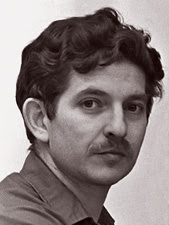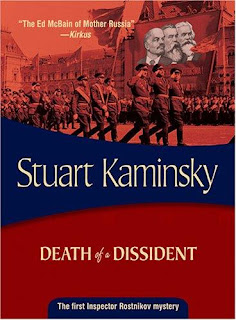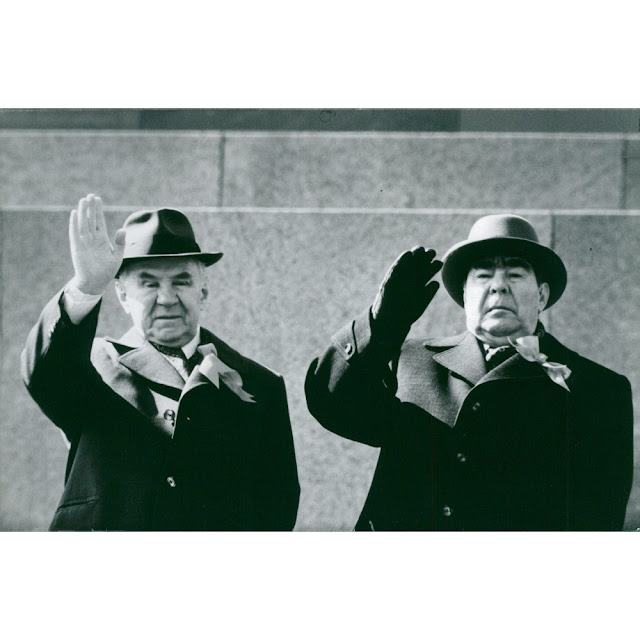My initial brainstorm was to
copy Stuart Kaminsky's complete introduction to the Mysterious Press
edition of his Death
of a Dissident
with maybe a highlight here and there and an occasional comment of my
own to break it up. But I quickly realized copyright restrictions
would undoubtedly toss a greasy wrench into the plan, so I knew I'd
have to get off my lazy metaphoric butt and write an actual review.
Rest assured, however, Kaminsky's introduction is so good I still
intend to use great chunks of it, either in paraphrase or as direct
quotes. It's (as I would argue to the judge in a copyright
infringement lawsuit) unavoidable!
For one, Kaminsky relieved some of
my reluctance to read his crime novel about a Moscow cop, concerned
that maybe he wouldn't measure up well with Martin Cruz Smith's
Arkady Renko. I'd just finished re-reading the Renko
series
and enjoying it even more than I had the first go-round. Kaminsky
addresses that concern head-on. By coincidence, Death
of a Dissident came
out about a month after Gorky
Park, the
first Renko episode.
"Though I had
enjoyed Martin Cruz Smith’s novels— and still do," Kaminsky
tells us, "I couldn’t read Gorky
Park. The reviews
made it clear that
our
books bore only a superficial resemblance to each other."
I agree. Neither the plots nor
the styles are comparable much beyond their Soviet Russian milieu.
The Arkady Renko novels remind me more of the complex stories and
characterizations John le Carré
employs in his novels, whereas Death
of a Dissident
has an Ed McBain feel,
à
la his
87th
Precinct crime series. Oh, alright, I cheated on that one. Kaminsky
makes the McBain resemblance abundantly clear in his aforementioned
intro:
“I love Ed McBain’s 87th Precinct novels,” he says, and
mentions specific McBain influences throughout. But wait. “I also
love Georges Simenon’s Maigret novels, and John Creasy’s Gideon
novels were favorites of mine in high school. Above all, I love
‘classical’ Russian literature, particularly Dostoevsky and, even
more specifically, Crime
and Punishment.
And they
all, as well as Russian writers Chekhov and Gogol, come into play in
Death
of a Dissident.
His lead character, Chief
Inspector Porfiry Rostnikov, he frankly admits, “bears more than a
passing resemblance to Jules Maigret. His methods are similar, but
his milieu is much different. Rostnikov is, like George Gideon, a man
of action. And it is no coincidence that Porfiry Petrovich Rostnikov
bears the name of the magistrate who drives [Dostoevsky’s]
Raskolnikov to a confession of murder. Rostnikov, finally is my
fantasy of my Russian grandfather, my father’s father, who died
when I was about six.”
 |
| Stuart Kaminsky |
Another
ensemble character, one of Rostnikov’s assistants in Death
of a Dissident,
he tells us, has a quasi-role model from the Star Trek TV series.
“Emil Karpo...is a tall, gaunt, loyal, humorless traditionalist who
bears some resemblance to Mr...Spock. Karpo is a haunted man who had
devoted his life and loyalty to the religion of Communism which, as
practiced in the Soviet Union, keeps letting him down. Karpo wished
to deny his emotions, the needs of his body and the human loyalties
which, ultimately, are more immediate than his devotion to duty.”
Rostnikov’s other assistant,
Sasha Tkach (no help with the pronunciation) is, in some ways, what
Burt Kling might have become in the 87th Precinct novels, had life
not dealt him a monstrous love life and had he been plunked down in
contemporary Russia rather than in Isola. Sasha’s concerns are
domestic. Life, the complications of a changing Russia, a growing
family, and his inability to cope with women threaten to overwhelm
him.”
So there you have the three
lead characters, explained in a way I suspect most English
teachers—high school presumably and most certainly undergraduate if
we’re talking college—would accept as analyses in a homework
composition or surprise quiz. And there’s even more in Kaminsky’s
intro for the serious pseudo-scholastic plagiarist.
As
for the plot, it’s classic McBain/Simenon/Creasy police procedural.
A famous Soviet dissident is murdered with a sickle in his apartment
a day before his scheduled trial, despite being under constant KGB
surveillance. Hmmm. The Soviets appear to be torn between rejoicing
and fearful the dissident’s death will reflect badly on them in the
West, as though due process was denied. So Rostnikov and his
sidekicks are encouraged to find the murderer so it appears justice
has been done. Any murderer will suffice so long as the government
can claim deniability. Rostnikov answers to the Cbief Procurator in
his precinct (or district or whatever the hell the Moscow political
division is called) is a good party member, but respects Rostnikov,
who is a good cop, and superficially a good party member. They get
along, unlike Renko and his bosses (called “prosecutors” in those
novels), where barely concealed corruption makes a mockery of party
ideals with every blink of every eye.
The
police work is credible and interestingly revealed, providing
opportunities to develop the characters in both their official and
domestic roles. Investigation is methodical, and when the routine
seems to be getting a tad tedious, some plausible action occurs to
break up the pace. One irritant broke up the mood for me, disrupting
my identification with the lead characters:
changing points of view. It’s one of the things I don’t like
about McBain’s novels. Too many heads to be inside, especially if
they’re villains. I did get to like the three main cops and their
procurator, a devout, workaholic Communist woman with an ailing
heart.
Thinking
the series was going to end after a
second outing,
Kaminsky says he considered killing off Karpo, the Spock character.
“In the first of several drafts of Black
Knight in Red Square,
Emil Karpo is killed. My editor and agent liked the character so much
that they persuaded me to let him live.” He notes that McBain
considered killing Steve Carella, his central character at the start
of the 87th
Precinct series. Fortunately for both series, the authors changed
their minds.
Kaminsky
tells of the trouble he had getting his Porfiry Rostnikov series off
the ground at all. “I liked what I had done.
My
agent liked what I had done. However, no hardcover publisher liked
what had been done so the book came out as a paperback original.
Death
of a Dissident
was submitted to the publisher and accepted almost a year before it
was published. [It]
suffered
the fate of most paperback originals:
no reviews.” Well, here’s one—better late than never, no?
Before
his death in 2009, he’d published fifteen more Rostnikov novels,
several other crime series, short stories and non-fiction works. His
fifth Rostnikov novel, A
Cold Red Sunrise
received the 1989 Edgar
Award
for Best Novel.


Mathew, I did not know that there was an introduction by Kaminsky in the Mysterious Press Kindle edition. Now I will have to buy that edition too. I only have the paperback edition. And this review also makes me want to read more of the McBain series also. I have only read the first four in that series. This is a wonderful review, I learned a lot from it.
ReplyDeleteThanks much, Tracy. I plan on reading more of the Rostnikov series, too. Thanks for the introduction!
Delete